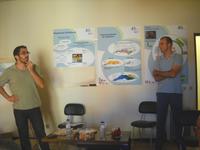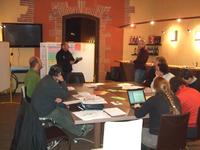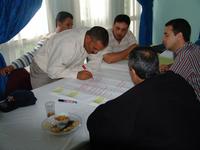Aquimed Activities and results
Activities and results
The Aquimed project activities have been organized around 3 components.
1) An initial analysis focused on the perceptions of the local populations of the climate and water resources variability , and on their vulnerability to such variability (see Bento et al., 2009).
2) Series of workshops were held with farmer groups and institutions in charge of agriculture and water management . These workshops involved foresight analyses, based on scenarios of possible evolutions of local economic activities and of water resources variations. Due to different institutional settings (presence/absence of an institutionalized process for groundwater resource planning and management) and groundwater status (current crisis versus risks of future crisis, i.e. the necessity to prepare future adaptation to climate change versus adapting to current climate variability), the initial common method was implemented with two alternatives, one in Portugal and France and the other in Morocco.
In France and Portugal, after a diagnosis phase, scenarios of agricultural development by 2030 were built based on available data and interviews of key stakeholders and informants. Farmer groups and institutions in charge of agricultural development and groundwater management were invited to discuss:
- the future of agriculture activities at aquifer level based on such scenarios;
- possible impacts of climate change on cultivation techniques and water resources;
- possible groundwater management rules.
In Morocco, farmers’ groups made an initial diagnosis of their own area, designed possible future scenarios for agriculture, and defined actions at aquifer level to ensure the most preferred scenario takes place. A similar work was achieved with staff of institutions in charge of
agricultural development. A final meeting involving participants of all groups enabled to compare and discuss together the analyses made, designed scenarios and proposed solutions.
3) Networks of exchanges between stakeholders and researchers from France, Morocco and Portugal , related to the project main themes, have been developed.
© Cirad 2010 - All rights reserved



